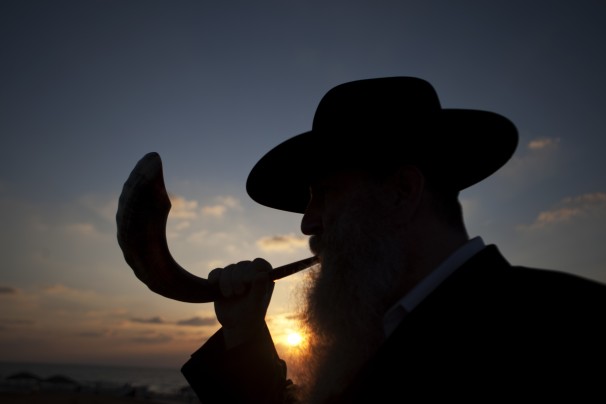Spiritual Sunday
For Rosh Hashanah, which begins Wednesday, I share a poem by Emma Lazarus, most famous for her lines on the Statue of Liberty. I didn’t know until I read her Wikipedia entry that Lazarus was an early proponent of a Jewish homeland. The descendent of Portuguese Sephardic Jews who moved to New York in colonial times, Lazarus became interested in her Jewish roots after reading George Eliot’s novel Daniel Deronda (1876), where the eponymous protagonist undergoes a similar conversion experience. She was further spurred into action when Russian Jews began flooding into the United States following the 1881 pogroms, referred to in the poem as “anguish wrought by priest and mob.”
The poem begins by noting that the Jewish new year does not occur in the dead of winter but during harvest time, when “orchards burn their lamps of fiery gold,/The grape glows like a jewel, and the corn/A sea of beauty and abundance lies.” As in her Statue of Liberty poem, she sees America, all the way to the Sierras, as a refuge to Jews fleeing from the steppes of Russia:
Even as the Prophet promised, so your tent
Hath been enlarged unto earth’s farthest rim.
To snow-capped Sierras from vast steppes ye went …
Lazarus imagines two streams of Jewish refugees, one heading to America, the other to the Holy Land. Both hold the scroll “high above flood and fire,” keeping the memory of the Temple alive as they “embrace the world,” thereby fulfilling God’s promise to Abraham and to Moses:
In two divided streams the exiles part,
One rolling homeward to its ancient source,
One rushing sunward with fresh will, new heart.
By each the truth is spread, the law unfurled,
Each separate soul contains the nation’s force,
And both embrace the world.
Can one really say about 1883/5643 that “never was the year/Greater with portent and with promise seen,/Than this eve now and here”? Well, when one looks at the tremendous contributions that the descendants of those Russian Jews would go on to make to the United States, and at how Lazarus was sowing the seeds of Zionism that would be taken up a few years later by Theodor Herzl, one can make the case that she doesn’t exaggerate by much the importance of the year. Here’s the poem:
The New Year
By Emma Lazarus
Rosh-Hashanah, 5643 [1883]
Not while the snow-shroud round dead earth is rolled,
And naked branches point to frozen skies.—
When orchards burn their lamps of fiery gold,
The grape glows like a jewel, and the corn
A sea of beauty and abundance lies,
Then the new year is born.
Look where the mother of the months uplifts
In the green clearness of the unsunned West,
Her ivory horn of plenty, dropping gifts,
Cool, harvest-feeding dews, fine-winnowed light;
Tired labor with fruition, joy and rest
Profusely to requite.
Blow, Israel, the sacred cornet! Call
Back to thy courts whatever faint heart throb
With thine ancestral blood, thy need craves all.
The red, dark year is dead, the year just born
Leads on from anguish wrought by priest and mob,
To what undreamed-of morn?
For never yet, since on the holy height,
The Temple’s marble walls of white and green
Carved like the sea-waves, fell, and the world’s light
Went out in darkness,—never was the year
Greater with portent and with promise seen,
Than this eve now and here.
Even as the Prophet promised, so your tent
Hath been enlarged unto earth’s farthest rim.
To snow-capped Sierras from vast steppes ye went,
Through fire and blood and tempest-tossing wave,
For freedom to proclaim and worship Him,
Mighty to slay and save.
High above flood and fire ye held the scroll,
Out of the depths ye published still the Word.
No bodily pang had power to swerve your soul:
Ye, in a cynic age of crumbling faiths,
Lived to bear witness to the living Lord,
Or died a thousand deaths.
In two divided streams the exiles part,
One rolling homeward to its ancient source,
One rushing sunward with fresh will, new heart.
By each the truth is spread, the law unfurled,
Each separate soul contains the nation’s force,
And both embrace the world.
Kindle the silver candle’s seven rays,
Offer the first fruits of the clustered bowers,
The garnered spoil of bees. With prayer and praise
Rejoice that once more tried, once more we prove
How strength of supreme suffering still is ours
For Truth and Law and Love.


